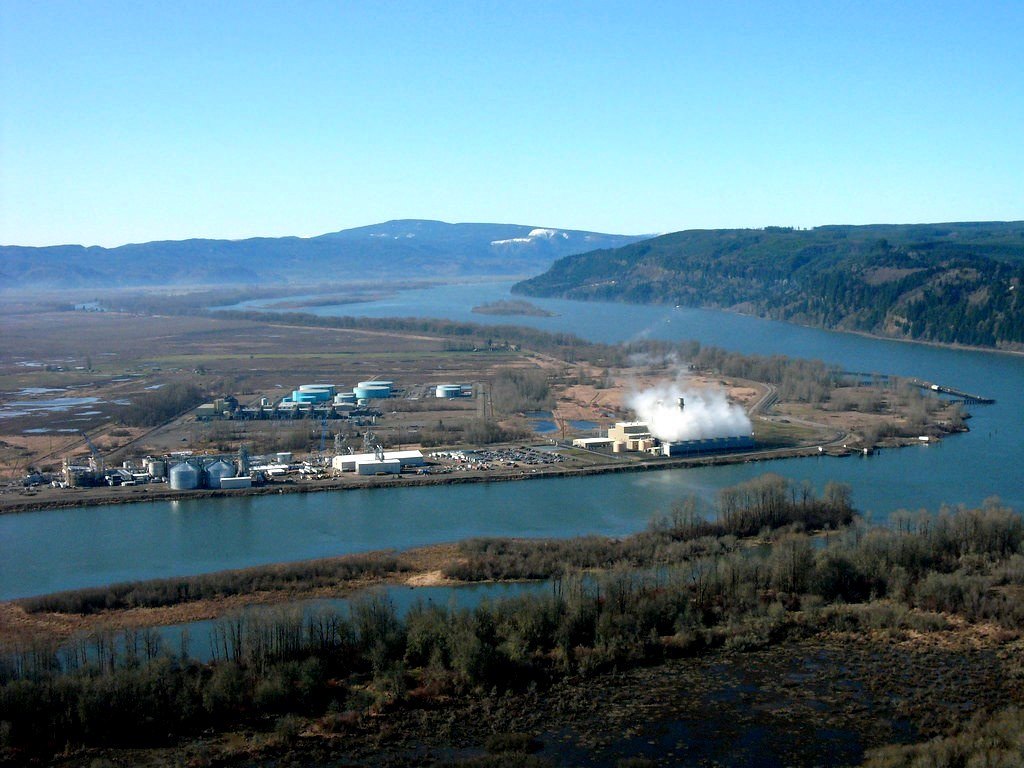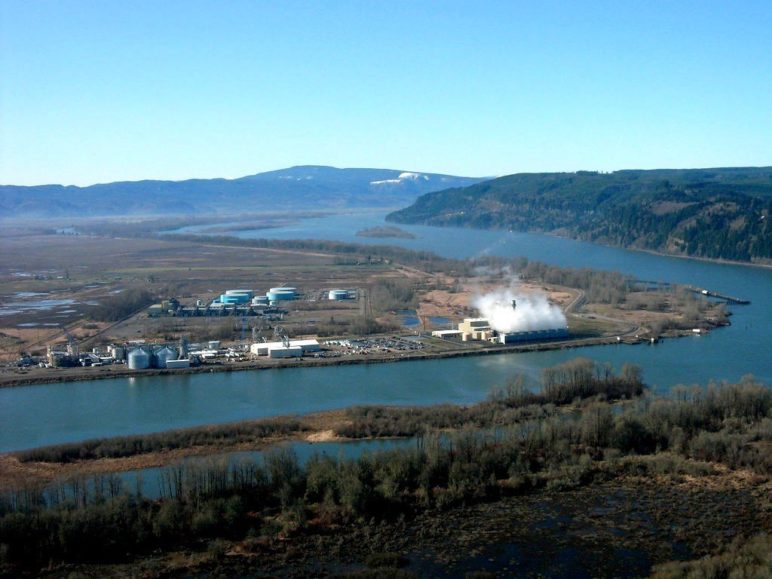Northwest communities have been knocking down oil train development proposals as fast as they can spring up. In the last two years alone the region’s opposition movement has, by various means, spiked projects all around western Washington: once in Vancouver, once in Anacortes, and three times in Hoquiam. One big proposal is still under review in Vancouver, but the odds of its approval are shrinking.
Stymied at every turn, there’s reason to believe the industry is now setting its sights on Port Westward, a small industrial park in rural northwest Oregon on the Columbia River. Those tracking the region’s fossil fuel export controversies may recall that Port Westward is the site of two failed coal export schemes, as well as an active proposal to build a huge petrochemical plant. It’s the same place where an energy company called Global Partners runs trains loaded with ethanol to a terminal for loading onto marine vessels.
Up until January 2016, Global Partners was moving crude oil by rail to the site—initially in gross violation of its state permits—but as oil prices tanked and markets shifted, the firm switched to ethanol. Now, the company is angling to substantially expand its holdings at Port Westward, and it looks very much like an attempt to become a big player in oil-by-rail. Global Partners is on the verge of striking a deal with Portland General Electric (a utility that owns a neighboring power plant) to acquire 1.2 million gallons of storage tank capacity, a pipeline connecting those tanks to the Port Westward dock, and permission to expand its on-site rail infrastructure.
The site is already badly polluted with serious oil contamination of the soil and groundwater. A 2012 peer-reviewed paper published in 2012 found that Chinook salmon nearby were contaminated enough by polycyclic aromatic hydrocarbons, which are derived from petroleum products, to harm their immune systems and reproductive abilities.
If approved by state regulators, the transaction would position Global Partners as the Northwest’s dominant oil train operator. The site is already permitted to received up to 120,000 barrels per day by rail, far more than any of the Puget Sound refineries that are allowed to handle oil trains. It’s the equivalent of roughly 12 loaded trains per week, all of which would travel through the Columbia River Gorge—the site of a catastrophic oil train explosion in June 2016—as far as Portland before transferring to the notoriously under-insured railroad that reaches Port Westward. At Port Westward, site operators would transfer the oil to above-ground storage tanks before loading it onto oceangoing vessels that would ship it to West Coast refineries or, if prices rebound, to export markets abroad.
The Oregon Public Utility Commission is weighing approval of the project. It can deny approval of the sale if regulators deem it not in the public interest. The agency is holding a public hearing on the project in Salem the morning of June 13. The good folks at Columbia Riverkeeper have details about the hearing and more information about the project.
Thanks to Alyse Nelson for research assistance.











Jan
Fidalgo Bay soaked with cPAHs, too. Criminal.
Robert McDonald
Why this incessant desire to install hazmat facilities on the Columbia River? As one who spent many years boating between Portland and Astoria, I can attest to the dangers of running large vessels – be they tankers or cargo ships – on that waterway. • Despite the river appearing to be wide, very wide at some locations, vessels, because of their DRAFT, are limited to an underwater “lane” – a channel – which is constantly maintained by dredges, to insure unobstructed vessel passage.
• The channel is ~110 miles long from Astoria to Portland/Vancouver, 43 feet deep at lower low water, and only 600 feet wide. See this detailed at: https://www2.portofportland.com/Marine/Navigation.
• A vessel must travel FASTER than the current in order for the rudder to have any affect on steering. That means vessels loaded with hazardous materials are traveling downstream. Strong currents result from tidal action, dam release, storm runoff, and general river flow.
• Two deep draft vessels PASSING each other are drawn together, increasing the chance of collision.
• Finally, it is a very winding route, with more than 100 course changes.
And that’s just for openers!
Eric Albert Jensen
As a former shipping agent for the Portland office of Trans America Shipping I wish to weigh in against this ill-conceived and poorly evaluated push to ship hazardous material, and at reckless speed at that, through the Columbia Estuary. I have seen the results of human error, including the rupture of the Exxon Mobile where an army of cleanup volunteers could not stop the contamination of the lower reach of the Columbia River and all the way into the pristine waters of Willapa Bay. There can be but one reason this most recent development effort by Big Oil being slipped past normal state and federal regulatory agencies: corruption. It is hoped that the racketeer behavior of our state politicians, particularly Oregon State Senator Betsy Johnson, is revealed in time to halt this outrageous corporate behavior. Signed, Eric Albert Jensen
Alysia
When where what time?
The indigenous people need to know and take a stand oppose this threat. #WaterIsLife
Eric de Place
It’s 9:30 am on Tuesday, June 13, 2017, at Oregon PUC Hearing Room 201, High Street SE, Salem, OR 97301
Larry White
So I see two trains come and go a week now at portwestward all have approximately 100 Black tank cars. So if they aren’t hauling oil and now it is natural gas, how much are they allowed to move in. And is natural gas not damaging as oil? This is feb 7 2018
Eric de Place
Larry, it could be any number of substances: crude oil, refined petroleum products, LPGs (aka propane, butane), ethanol, etc. It is not likely to be natural gas, which is not a legal commodity to haul on rails except in a couple of worrisome niche cases.
The best way to figure it out is to check the red hazmat placards on the rail cars. Each one of them should have a four-digit number that is a code for the contents. Do take a look and let us know what you learn!